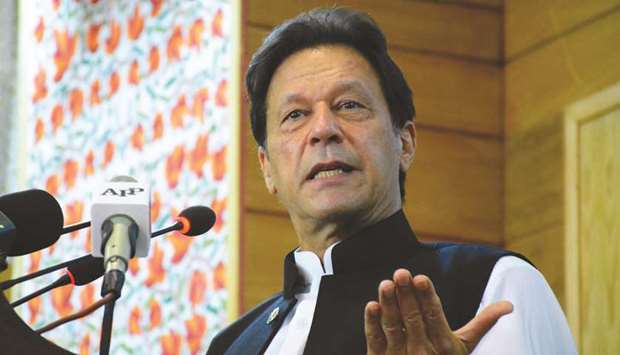Acknowledging that in Pakistan’s history, civilian and military leaderships have had a “chequered relationship”, Prime Minister Imran Khan said that his government has an excellent relationship with the armed forces.
Giving an interview to Al Jazeera, Khan said that “the military stands with us” and that “we have an excellent relationship”.
“I honestly think it’s the most harmonious relationship, we have complete co-ordination, we work together, the military completely stands with all the government’s democratic policies,” he said, adding that the armed forces and the civilian government are on the same page, whether it came to the India policy or peace in Afghanistan.
Speaking about the Afghanistan war, he said the 19 years of war had created such “divisions in society” that it is not possible for everyone to get together for peace all of a sudden.
However, the prime minister acknowledged that progress had been made in the peace talks.
“This is the nearest we have got to peace in Afghanistan and a political solution,” he said.
“Whatever the Afghans think is good for them, is good for us,” Khan said, adding that Pakistan had done whatever it could to get the Afghan government and the Taliban to the table for talks.
He acknowledged that there are elements aiming to “spoil” the peace process.
He said that India was not a stakeholder in the Afghanistan peace process as it did not have a border with Afghanistan, whereas Pakistan did.
“Instability there creates instability in the border regions what were former tribal areas of Pakistan and that creates a problem for the whole country,” he said.
Speaking on the India-Pakistan relations, PM Imran said that when he became prime minister, he extended “a hand of friendship towards India”.
In response to a question about whether he thinks Western countries abandoned Pakistan on the issue of Indian-administered Kashmir, the prime minister said that many countries unfortunately have commercial interests in mind.
“It doesn’t mean that we are sitting down and accepting this. We will keep trying,” he said.
In response to a question about freedom of the press and expression in Pakistan, Khan said that “blatant propaganda” had taken place against his government.
“In my two years of power, tell me how many journalists have been kidnapped in Pakistan,” he asked.
The prime minister said that he had spent 20 years of his life in the UK and he “knew what freedom of speech is”.
He said that if he was in the UK and the media there was criticising him in such a manner, his government would “have claimed millions of dollars of damages”.
“Unfortunately, it’s us, the government and the ministers who feel unprotected. It’s not the media,” said the prime minister.
Khan called into question the definition of intimidation, saying that if fake news is published against the prime minister, and the premier then decides to take that journalist to court, it should not be called intimidation as it “happens everywhere around the world”.
Answering a question about Pakistan’s relations with Saudi Arabia, he said that the kingdom will “always be a friend of Pakistan”, although he admitted that Islamabad wanted the Organisation of Islamic Co-operation (OIC) to take a leading role when it came to the issue of Indian-administered Kashmir.
On the recent normalisation of ties between Israel and the UAE, the prime minister categorically said that “any one-sided solution” will not work.
“Israel must realise this, if they do not allow the Palestinians to have a just settlement, a viable state, this issue’s not going to die down. Even if some countries recognise Israel, it’s not going to die down,” he added.
On whether Islamabad plans to renegotiate its terms on the China-Pakistan Economic Corridor (CPEC) with Beijing, Khan rejected the notion, adding that Pakistan’s relationship with its ally is better than ever.
“Pakistan’s economic future is linked to China,” he said. “China is growing at a faster pace than any other country, and Pakistan, you know, can really benefit from the way China has developed.”
When asked if Pakistan is resetting its ties with the United States, the prime minister wondered why it has to be an “either, or” formula.
“Why does Pakistan have to be in any camp?” he asked. “Every country looks to its own interests.”
“Why can’t we have good relations with everyone,” Khan stated, adding that Islamabad and Washington enjoyed good relations as both are “partners for peace in Afghanistan”.
Rejecting the notion that he had a “small window” to deliver on his promises that he made to voters, the premier said that Pakistan no longer made policies for the poor.
“Our construction policy, the education policy and our economic policies are all aimed at getting the poor out of poverty,” he said, highlighting his government’s healthcare insurance initiative in Khyber Pakhtunkhwa, and its aim to introduce a uniform education syllabus across the country.

Prime Minister Khan: the military completely stands with all the government’s democratic policies.
